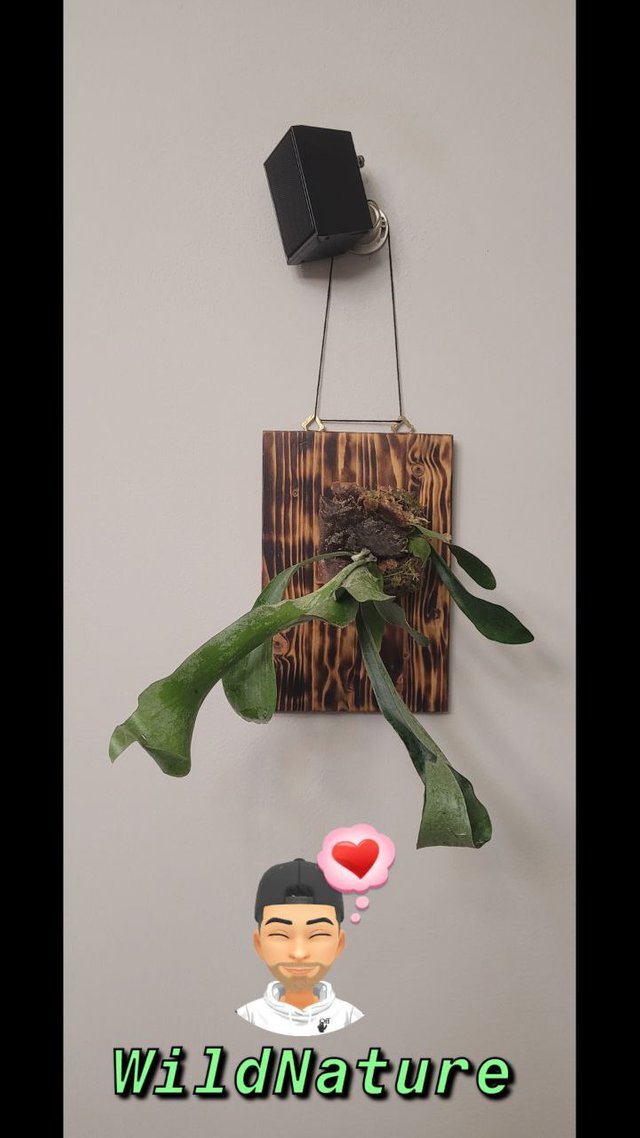Felce corna di cervo 🪴❤️
The English version follows in the end.
Versione Italiana 🇮🇹🇮🇹🇮🇹

Il Platycerium, comunemente noto come felce "corna di cervo", è una pianta epifita appartenente alla famiglia delle Polypodiaceae. Originaria delle foreste tropicali e subtropicali dell’Africa, dell’Asia, dell’Australia e delle Americhe, questa felce è particolarmente apprezzata per le sue foglie caratteristiche che somigliano a corna di cervo, rendendola una pianta ornamentale unica e di grande effetto.
La Platycerium è una felce epifita, il che significa che cresce attaccata agli alberi senza nutrirsi della loro linfa, sfruttando invece l'umidità e le sostanze organiche dell'ambiente circostante. Presenta due tipi distinti di fronde: quelle basali, tondeggianti e di colore marrone, che si adattano al substrato e aiutano la pianta ad ancorarsi, e quelle fertili, più lunghe e ramificate, che ricordano le corna di un cervo e che svolgono la fotosintesi.
Per quanto riguarda la coltivazione, la felce "corna di cervo" è una pianta relativamente facile da curare se coltivata in condizioni simili al suo habitat naturale. Preferisce ambienti umidi e ombreggiati, ideali per ricreare il sottobosco delle foreste tropicali, dove la luce è filtrata. Il substrato ottimale per la coltivazione di questa felce è costituito da fibra di cocco, corteccia e sfagno, che garantiscono il giusto livello di aerazione e trattenimento dell'umidità.
L'irrigazione deve essere regolare, ma evitando ristagni; è consigliabile nebulizzare frequentemente le foglie, soprattutto durante i mesi caldi, e ridurre l'irrigazione in inverno. Un ambiente umido favorisce la crescita della felce, perciò è utile posizionarla in una stanza con alta umidità, come il bagno o la cucina, oppure vicino ad altre piante che aiutano a mantenere l’umidità costante.
E voi, avete mai coltivato una felce "corna di cervo"? Fatemi sapere nei commenti cosa ne pensate a riguardo e lasciate un "like" se apprezzate questa pianta unica! 👍🪴✨❤️
(Foto scattata da me) 📸
English version 🇬🇧🇬🇧🇬🇧

The Platycerium, commonly known as the "staghorn fern," is an epiphytic plant belonging to the Polypodiaceae family. Native to the tropical and subtropical forests of Africa, Asia, Australia, and the Americas, this fern is especially prized for its distinctive, antler-like leaves, which make it a unique and striking ornamental plant.
The Platycerium is an epiphytic fern, meaning it grows attached to trees without drawing nutrients from them, instead absorbing moisture and organic matter from the surrounding environment. It has two distinct types of fronds: the basal, round, brown fronds that adapt to the substrate and help anchor the plant, and the fertile fronds, which are longer, branching, and resemble antlers, playing a key role in photosynthesis.
In terms of cultivation, the "staghorn fern" is relatively easy to care for when grown in conditions similar to its natural habitat. It prefers humid, shaded environments, ideal for recreating the filtered light of tropical forest understories. The optimal substrate for this fern consists of a mix of coconut fiber, bark, and sphagnum moss, ensuring the right balance of aeration and moisture retention.
Watering should be regular but without overwatering; it is advisable to mist the fronds frequently, especially during warmer months, and reduce watering in winter. A humid environment supports the fern’s growth, making it ideal to place it in rooms with high humidity, such as the bathroom or kitchen, or near other plants that help maintain consistent moisture levels.
Have you ever grown a "staghorn fern"? Let me know in the comments your thoughts on this beautiful plant, and give a "like" if you appreciate it! 👍🪴✨❤️
(Photo taken by me) 📸
